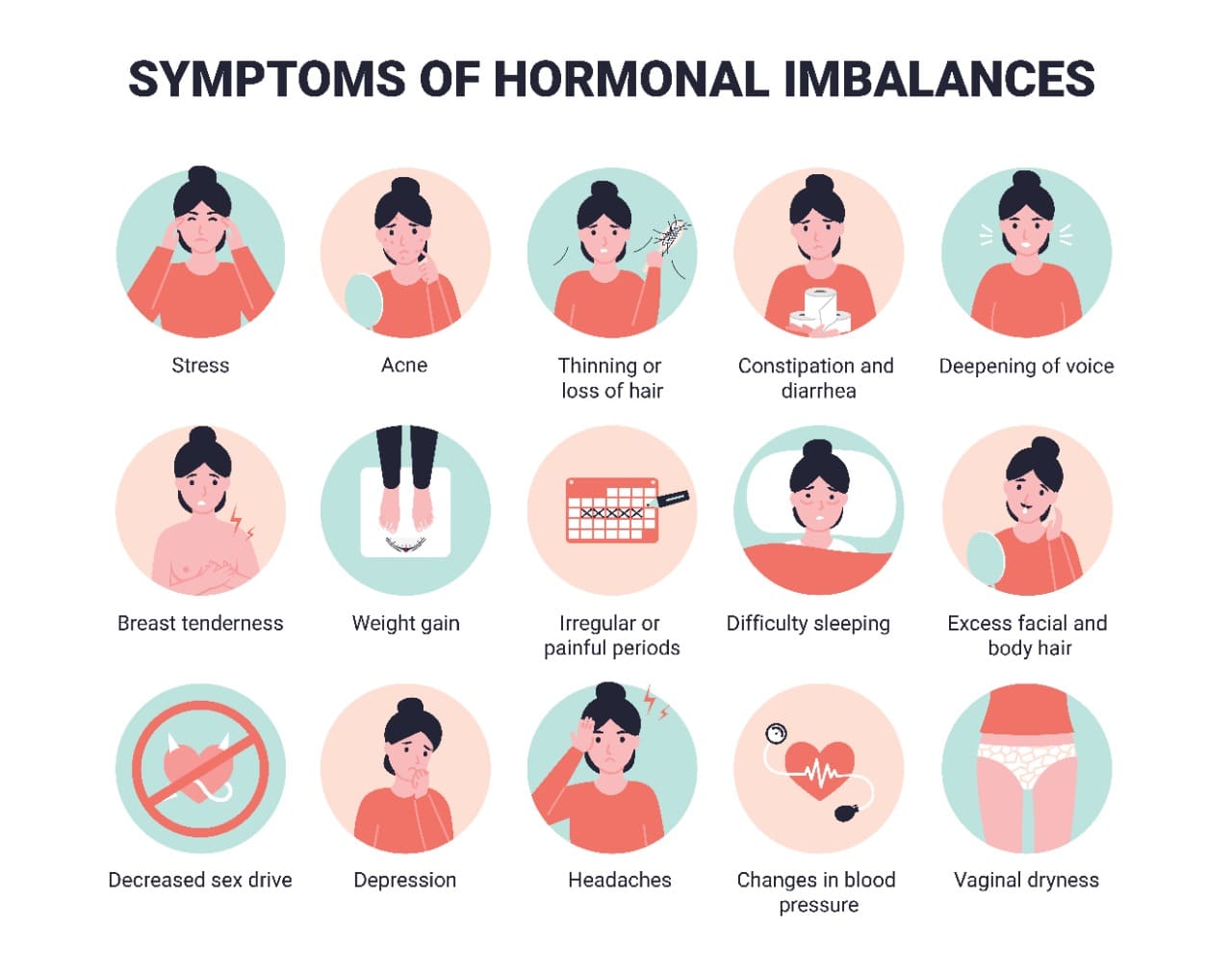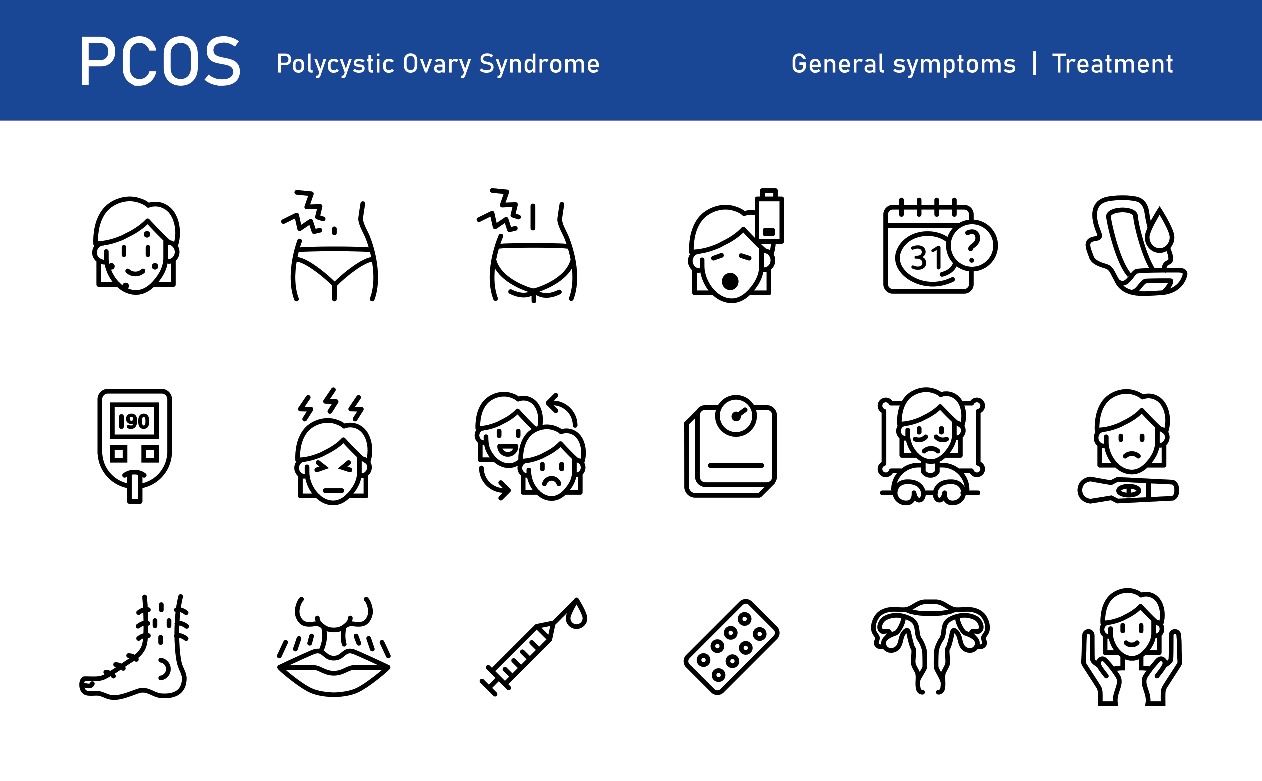Hormone Imbalance in Females: Cause, Symptoms, Affect
Hormone Imbalance in Females: Cause, Symptoms, Affect

Dr Disha Sridhar
I am a Gynaecologist Obstetrician ( MD, DNB OBGYN) with an emphasis on INTEGRATIVE MEDICINE.

Hormone Imbalance in Females
Hormonal imbalance in females can manifest in various ways and can be caused by several factors. The most common symptoms of hormonal imbalance in females include irregular periods, mood swings, weight gain and more.
One of the most common causes of hormonal imbalance in females is polycystic ovary syndrome (PCOS). This condition is characterized by multiple small cysts on the ovaries and an excess of androgens (male hormones) in the body. Symptoms of PCOS can include irregular periods, acne, and excessive hair growth.
Another common cause of hormonal imbalance in females is thyroid dysfunction. The thyroid gland in the neck produces hormones that regulate metabolism. When the thyroid gland doesn't function correctly, it can lead to weight gain, fatigue, and depression.
Hormonal imbalances can also occur during perimenopause and menopause when the ovaries stop producing estrogen and progesterone. It can cause hot flashes, night sweats, and vaginal dryness.
Treatment for hormonal imbalances in females depends on the underlying cause. For example, if PCOS causes the imbalance, treatment may include medications to regulate menstrual cycles and reduce androgen levels. However, this doesn't address the ROOT CAUSE OF THE PROBLEM. If the imbalance is caused by thyroid dysfunction, treatment may include hormone
Causes of Hormone Imbalance
Hormone imbalance is a common condition that affects millions of people worldwide. It occurs when the hormones in the body are too high or too low, leading to various symptoms such as weight gain, fatigue, mood swings, and more.
1.Stress- Stress is one of the most common causes of hormone imbalance. When we are under stress, our bodies release a hormone called cortisol, which helps us to cope with the stress. However, when cortisol levels are consistently high, it can disrupt the balance of other hormones in the body, leading to symptoms such as weight gain, fatigue, and mood swings.
2. Poor Diet- A poor diet can also lead to hormone imbalance. Consuming too many processed foods, sugar, and unhealthy fats can disrupt the balance of hormones in the body. Additionally, a diet that is lacking in essential nutrients can also contribute to hormone imbalance.
3. Lack of Exercise- Regular exercise is essential for maintaining hormone balance. When we don't get enough exercise, our bodies don't produce enough hormones like testosterone and estrogen, which usually lead to symptoms such as fatigue and weight gain.
4. Hormonal Changes- Hormonal changes are a natural part of life but can also contribute to hormone imbalance. For example, during menopause, women experience a decline in estrogen levels, leading to symptoms such as hot flashes and mood swings. Similarly, during pregnancy, women experience a hormone surge, leading to morning sickness symptoms.
5. Medications- Certain medications can also disrupt hormone balance. For example, birth control pills, hormone replacement therapy, and antidepressants can all affect hormone levels in the body.

Hormonal Imbalance Symptoms in Females
Hormonal imbalances can cause a wide range of symptoms in females, many of which are often not discussed or widely known. These symptoms can include weight gain, mood swings, acne, and irregular periods. However, some less common symptoms can indicate a hormonal imbalance.
One symptom that is not often talked about is hair loss. Hormonal imbalances can cause hair to be thin or fall out, particularly in female pattern hair loss. This hair loss is caused by an excess of androgens, or male hormones, in the body.
Another symptom that is not often discussed is brain fog. Hormonal imbalances can cause a lack of focus and concentration, making it difficult to complete daily tasks. Various hormones, including thyroid hormones and estrogen, can cause this.
Insomnia is also a symptom of hormonal imbalances that is not often discussed. Hormonal imbalances can cause sleep disturbances, making sleeping difficult throughout the night. Various hormones, including cortisol and melatonin can cause this.
Another symptom of hormonal imbalances that are not often discussed is depression and anxiety. Hormonal imbalances can cause mood swings, making it difficult to manage emotions. A number of hormones, including serotonin and dopamine can cause this.
It is important to note that these symptoms can also be caused by other factors, such as stress or medication. However, if you are experiencing any of these symptoms impacting your daily life, you should speak with your healthcare provider about testing for hormonal imbalances. With the help of a healthcare professional, you can address any imbalances and take steps to improve your overall health and well-being.
Hormonal imbalances can cause a wide range of symptoms in females, many of which are often not discussed or widely known. Symptoms such as hair loss, brain fog, insomnia, depression, and anxiety can all be indicators of hormonal imbalances. Suppose you are experiencing any of these symptoms. In that case, it is important to speak with your healthcare provider to rule out any hormonal imbalances and take steps to improve your overall health and well-being.

Medical Conditions That Can Affect Hormones?
Hormones are chemical messengers the endocrine glands produce that regulate various bodily functions such as growth, metabolism, and sexual development. Hormone imbalances can occur due to a variety of medical conditions, leading to a wide range of symptoms.
1. Hypothyroidism: This condition occurs when the thyroid gland, located in the neck, produces too little thyroid hormone. This can lead to symptoms such as fatigue, weight gain, and cold intolerance.
2. Hyperthyroidism: On the other hand this condition occurs when the thyroid gland produces too much thyroid hormone. Symptoms can include weight loss, rapid heartbeat, and heat intolerance.
3. Diabetes: This condition is caused by a lack of insulin production or resistance to insulin. Insulin is a hormone that regulates blood sugar levels. Symptoms can include increased thirst, fatigue, and blurred vision.
4. Polycystic ovary syndrome (PCOS): This condition is characterized by an imbalance of sex hormones, leading to irregular menstrual periods, acne, and excess hair growth.
5. Cushing's disease: This is a rare condition caused by an excess of the hormone cortisol, which can lead to symptoms such as weight gain, thinning skin, and high blood pressure.
6. Addison's disease: A rare disorder of the adrenal glands, which can lead to a deficiency of cortisol and aldosterone hormones. Symptoms can include fatigue, weight loss, and low blood pressure.
7. Pituitary disorders: The pituitary gland produces several hormones that regulate various bodily functions. Disruptions in the pituitary gland can lead to various symptoms, depending on which hormone is affected.
Treatment Options for Hormonal Imbalances Include:
1. Hormone replacement therapy (HRT) involves taking hormone supplements to bring your levels back to normal. HRT is commonly used to treat menopause-related symptoms and can be administered in the form of pills, skin patches, gels, or creams.
2. Birth control pills: Birth control pills can help regulate menstrual cycles and reduce symptoms of hormonal imbalances such as acne, heavy bleeding, and painful periods.
3. Medications: Certain medications such as Metformin, Clomiphene, and Letrozole can be prescribed to balance; however, the best thing is to address the ROOT CAUSE with nutrition, lifestyle changes, natural supplements and detoxification as it can give you long-term results without side effects.
4. Lifestyle changes: Changing your diet and exercise routine can help balance hormones and improve overall health. Eating a balanced diet with plenty of fruits, vegetables, and lean protein and limiting processed foods and sugar can help.
5. Herbal supplements: Herbs like Maca root, Ashwagandha, and Vitex have traditionally balanced hormones. However, it is essential to consult with a healthcare provider before taking any herbal supplements, as they can interact with other medications or have side effects.
Complications due to Hormone Imbalance
Hormone imbalances can lead to a variety of complications in the body. These imbalances can occur for various reasons, including genetics, illness, and certain medications.
One of the most common complications due to hormone imbalances is weight gain. Hormones play a crucial role in regulating metabolism, and imbalances can disrupt this process, leading to weight gain and difficulty losing weight.
Another complication of hormone imbalances is fatigue. Hormones regulate energy levels in the body, and imbalances can lead to feelings of fatigue and low energy.
Hormone imbalances can also lead to mood changes and mental health issues. For example, imbalances in the hormone serotonin can lead to depression and anxiety.
In women, hormone imbalances can also lead to irregular periods and difficulty getting pregnant. Imbalances in estrogen and progesterone hormones can disrupt the menstrual cycle and make it difficult for a woman to conceive.
Hormone imbalances can also lead to skin issues such as acne, dryness, and wrinkles. Hormones regulate the production of oil in the skin, and imbalances can disrupt this process.
It is important to seek medical attention if you suspect you have a hormone imbalance. Your doctor can perform tests to determine if an imbalance is present and recommend treatment options. Treatment options may include medication, lifestyle changes, and hormone replacement therapy.
It's important to take hormone imbalances seriously, as they can lead to a variety of complications and negatively impact a person's overall health and well-being. Seek medical attention if you suspect you have a hormone imbalance, and work closely with your doctor to develop a treatment plan.

Natural Aays to Balance Your Hormones
There are several natural ways to help balance hormones, including:
- Eating a balanced
diet that is rich in fruits, vegetables, and whole grains. Women are cyclic
beings and it's important to honour your menstrual cycle in whatever you
do. Check SHE-TO METHOD
- Exercising regularly can help improve insulin sensitivity and reduce stress.
- Managing stress through techniques such as meditation, yoga, or deep breathing.
- Getting enough sleep, which is essential for maintaining healthy hormone levels.
- Maintaining a healthy weight, as being overweight or obese, can contribute to hormonal imbalances.
- Avoiding environmental toxins, such as pesticides and plastic products.
- Herbal supplements such as maca root, Ashwagandha, and Chasteberry are known to be beneficial for hormone balance.
- Minimizing processed food, alcohol, and caffeine consumption.
- Manage stress through yoga, meditation, and deep breathing techniques.
- Talk to your doctor about medications and how they may impact your hormone levels.
Click here to learn more about: What promotes hormonal balance?
When should you see a Doctor?
It's important to note that it's always best to work with a healthcare professional to determine the best course of action for your individual needs, as a variety of factors can cause hormone imbalances, and treatment may vary depending on the underlying cause.
When Should you See a Doctor in Case of Hormonal Imbalance?
It's a good idea to see a healthcare professional if you are experiencing symptoms of a hormonal imbalance, such as:
- Unexplained weight gain or weight loss.
- Fatigue.
- Difficulty sleeping.
- Mood changes, such as depression or anxiety.
- Irregular menstrual cycles.
- Hot flashes or night sweats.
- Low libido.
- Trouble concentrating or memory loss.
Suppose you have any of these or other symptoms that may be related to a hormonal imbalance. In that case, it's important to see a healthcare professional for proper diagnosis and treatment.
Additionally, suppose you have a history of hormone-related conditions such as polycystic ovary syndrome (PCOS) or thyroid disorders. In that case, scheduling regular check-ups with your healthcare professional to monitor your hormone levels is important.
It's worth noting that some symptoms can be caused by other medical conditions or lifestyle factors, so it's important to work with a healthcare professional to determine the underlying cause and the best course of treatment.

